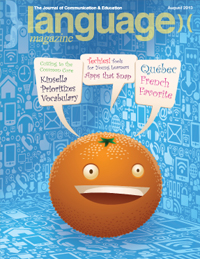It’s not surprising that close to 200,000 students come to study in Canada every year, and that number looks set to double over the next few years. Canada’s quality of life has been ranked in the top three for seven years in the UN Quality of Life Index, and it is renowned for having the highest penetration of post-secondary education in the world.
The cultural, scientific, and social contributions of Canadians are too long to list, but perhaps the most important benefits for studying French in Canada stem from the relationship of language to the Canadian identity and the resultant value placed upon language. It is safe to say that language is a cornerstone of Canadian identity. Bilingualism is embedded in the constitution and in its history, second language is favored in education, and the federal government alone invested over $1.1 billion in official languages (French and English) in the “Roadmap for Canada’s Linguistic Duality 2008-2013.”
And French is certainly not on the wane in Québec — according to the latest figures from Statistics Canada’s National Household Survey, 94% of Quebecers spoke French at work in 2011, the same as five years previously.
The province’s two major cities, Montréal and Québec City, have also been receiving a lot of attention recently. Montréal was listed among the top ten cities to visit in 2013 according to Lonely Planet’s Best in Travel 2013, and it was one of only two North American cities on the list. The authors underline the unique art of living and joie de vivre travelers can experience in the city. They also point out the great variety of festivals and events held in the city, plus its numerous cultural and natural attractions.
“We chose Montréal for Best in Travel 2013 due to its mélange of cultures, socially responsible businesses, great food, and unique style,” says Jennye Garibaldi, Lonely Planet’s commissioning editor for Canada. “And with the launch of the new Rio Tinto Alcan Planetarium, the unveiling of the Grévin Wax Museum, and the 50th anniversary celebrations at the Place des Arts, Montréal’s social calendar is overflowing in 2013.”
The city’s reputation for cutting-edge creativity has led to the recent publication of the Guide to Creative Montréal which showcases the city’s buzzing arts and culture scene. The guide includes ten self-guided tours throughout various city neighborhoods. Each tour features five major themes: digital arts, visual arts, performing arts, music, and design.
“With an abundance of events and venues highlighting the city’s creativity, Montréal is a vibrant city distinguished for its modernity, originality, and inspiration,” underlines Charles Lapointe, president and CEO of Tourisme Montréal. With the objective to develop cultural tourism, we believe that our creativity is worth showcasing as one of our city’s greatest assets and a motor to tourist appeal.”
According to a recent study, 75% of respondents agreed that Montréal stands out from other major international destinations because of its creative cultural activities.
And Québec City has just been voted the top destination in Canada and the eighth best in North America by the readers of the prestigious tourism magazine Travel+Leisure. In its 2013 World’s Best Awards, Québec City has moved up a rung since last year, surpassing Vancouver as the most popular Canadian destination. This achievement means Québec City keeps its prized spot in the Hall of Fame, a select group of destinations that have ranked highly for ten or more consecutive years.
CEC Séjours Linguistiques
With centers located in Montréal and Québec City, CEC is well equipped to organize French-language travel programs to the province of Québec. CEC helps teachers plan and organize outstanding linguistic and cultural trips for their students. Their extensive and intimate knowledge of Québec allows for highly customizable programs and innovative options. All logistics of the trip are taken care of so that teachers can enjoy the trip with students and remain confident that the trip’s objectives will be met. Summer French-language camps in Québec City and Montréal receive groups and individual students. Accommodations with local families or in a student dorm are available. Both programs feature French courses in the mornings and fun cultural activities in the afternoons. CEC offers a popular French Teacher Development program in Québec City during July. The program aims to help teachers further improve their linguistic skills as well as learn about and improve French teaching strategies and tactics. The program has a strong emphasis on sharing experiences and collaborating with peers. CEC Séjours Linguistiquess’ mission is to provide outstanding study abroad experiences. They take pride in selecting their educational partners with great care, and as language professionals, they have a specific interest in ensuring that the quality of language instruction meets high standards.
CISS
As a bilingual city, Montréal offers the perfect environment for studying French while enjoying the comfort of exposure to English. Program options offered by CISS include short-term residential summer experiences (ages 11-15) in French, English, or a combination of both languages. For the more ambitious French student, the opportunity exists for placement in an English-speaking high school, augmented by strong French immersion programming. For the intermediate to advanced French speaker, complete French-language integration is available in smaller, francophone communities outside Montréal, including beautiful Mont Tremblant. An essential component to the complete high school experience is placement in a caring and qualified homestay family. This unique region offers the opportunity for French, English, or bilingual family placement. For over 30 years, CISS has specialized in offering quality language, recreation, and academic experiences for global students.
College Platon
College Platon is a coeducational, multicultural private language school dedicated to the highest standard of linguistic instruction while maintaining the most reasonable tuition fees in North America.
The school was founded 56 years ago with a guiding mission that learning languages is a fundamental key to higher learning and to securing a career in a global economy. Moreover, integral to this philosophy is that education is not a prerogative of the elite and that education should be financially accessible. College Platon is committed to providing a high-quality, academically comprehensive curriculum with the most effective and efficient learning instruction. Students from all over the world can expect a positive and engaging academic atmosphere, which assists them in their pursuit of the language proficiency needed to reach their educational goals or careers, or simply for self-improvement.
College Platon embraces students from every continent, and often their experience here is the vehicle in forging lifelong friendships. Courses available include intensive English/French courses, semi-Intensive English/French courses, evening English/ French courses, 28 languages in a group, and private lessons. New sessions start on the first Monday of each month.
Culture and Language Connections
“Speak a new language so that the world will be a new world.” This was the advice of Rumi, the thirteenth-century Sufi poet. His words seem especially pertinent in Montréal today, with its rich diversity of cultures and languages. Consider, for example, the experience of one American woman. “I’ve lived in Montréal for several years, but only recently got over my hesitation to speak French,” she says. “Now, it’s as if the city itself is more vibrant, more alive… as if I’m able to drink more deeply from all that Montréal has to offer.” Her inspiration came from Culture & Language Connections, a local language school with a unique emphasis on conversation. With the smallest class sizes in Montréal and lessons developed according to personal learning patterns, CLC is unusually effective at helping people speak a new language with ease. Within their beautiful, sun-filled facilities in the heart of Monkland Village in NDG, you’ll find a lively mix of local learners as well as people from around the world who come for several months of French intensive lessons. For CLC’s founder, Arnel Javier, it’s about more than language lessons, though. “Human connection is why we exist,” he says. “It gives us meaning and purpose. Language is a tool that helps facilitate this connection.” With all their emphasis on community and connection, there’s something almost tangibly different about CLC. They say it “feels like home, no matter where you’re from.” It’s this nurturing environment that gives people the courage to experiment with new sounds and vocabulary. It seems that it’s also the kind of rare, precious culture that helps people discover themselves along the way.
École internationale de français (ÉIF) de l’Université du Québec à Trois- Rivières (UQTR)
Located on the shore of the St. Lawrence River, halfway between Montréal and Québec City, Trois-Rivières offers an ideal site for a total French immersion experience.
Founded in 1969, UQTR has welcomed 13,000 students enrolled in more than 165 programs. The campus is a quiet, pleasant, and safe environment including plenty of green space.
The ÉIF has designed programs to provide students with the ability to communicate effectively in French with an emphasis on written and oral skills. Programs are offered year-round in a relaxed, informal atmosphere in which students and professors work together closely in learning activities.
Their French immersion programs consist of three-hour classes every morning with workshops in the afternoon (conversation, diction, theater, songs), and social activities in the evening. There are several outings on the weekends (Montréal, Québec City, La Mauricie National Park).
Facilities include a modern gym, an Olympic indoor pool, a twelve km cycling path, banking services, student café, and campus residence/homestay.
École Québec Monde
École Québec Monde is a language school offering French classes to anyone in the world who wishes to experience a French- language-study stay in Québec City. The ultimate goal of their programs — Intensive French: group of eight students maximum, 20 hours/week; Individual French: one to 35 hours/week; Personalized French combination of intensive and individual — is to enable students to communicate in French, with self-assurance, ease, and accuracy. We achieve this by helping them develop skills in reading, writing, and especially speaking and listening. We focus on improving all students’ language levels, recognizing their strengths, and zeroing in on their weaknesses.
École Québec Monde is located in downtown Québec City, across from the Gabrielle-Roy public library, close to numerous restaurants, cafés, shops, parks, and cultural institutions. It is a few minutes’ walk from Le Château Frontenac, Le Vieux-Québec, La Gare du Palais — which houses the city’s train station and bus terminal and pedestrian and bike paths.
École Québec Monde offers a unique and personalized approach where the student soaks in the French-speaking environment and Québécois’s joie de vivre. An experienced management staff, a team of qualified and skilled teachers, a warm atmosphere, and an exceptional geographical location.
École Québec Monde offers a unique and personalized approach where the student soaks in the French-speaking environment and Québécois’s joie de vivre. An experienced management staff, a team of qualified and skilled teachers, a warm atmosphere, and an exceptional geographical location speak volumes in its favor.
The school is right in the heart of Québec City, the flagship location of French-language culture and the oldest city in North America.
ILSC
ILSC is located in the heart of charming Old Montréal in a state-of-the- art new facility where a wide range of courses at various levels are taught. Their small classes are taught using a student-centered approach and communicative methods by highly qualified instructors. ILSC is a member of Languages Canada. They also offer specialty programs such as DEFL preparation, French through Montréal, French through Fashion and Design, or French through Filmmaking and Photography. They can also organize customized group programs for you and your students. Language Coop programs and University Pathway programs are also available. In addition, ILSC has created a unique teacher-training program for French instructors (current or future): CEFLE (Certificat en enseignement du français langue étrangère). This certification uses a communicative approach and has been accredited by l’UQO (Université du Québec en Outaouais). It is ideal for anyone wanting to travel and teach French abroad or existing teachers who want to obtain a recognized teaching certification in four weeks.
Université Laval, Québec
In Québec, a UNESCO World Heritage City, the language school at l’Université Laval (ÉLUL) has become a model for its outstanding French as a Foreign Language immersion programs since 1937. Today, l’École de langues is the gateway to Université Laval, the oldest francophone university in North America, for those wishing to begin French studies or to perfect their knowledge of the language. Everyone interested in French language and culture and aged 18 and over can take a course at ÉLUL: student, professional. Fifteen-week or five-week immersion programs are available. There’s also a microprogram (with four levels) and a certificate. What makes Université Laval so special? Its learning environment: a beautiful, green campus by the St. Lawrence River, just 15 minutes from downtown Québec City. The high level of teaching, an immersion program which encourages conversation, and le Service d’animation de l’École de langues, which offers students a variety of activities in an environment which is 100% French-speaking. The Service organizes linguistic exchanges with native French speakers and activities specifically designed for students aged 30 and over, le Club des maîtres. Adapted to students’ interests and language levels, many cultural, sports, and tourist programs allow students to improve their French skills while having lots of fun together.
YMCA International Language School
The YMCA International Language School, located in Montréal, was established in 1965 and is a part of YMCA’s international network, present in over 130 countries. The school is located in the heart of downtown, near shopping, restaurants, and a plethora of tourist attractions. Each year, YMCA’s international language school hosts over 4,800 students from all over the world. They offer a variety of courses with three to 15 students per class in order to maximize learning. The recently renovated campus includes 27 well-lit classrooms, two language laboratories, wireless internet, and a student lounge. The YMCA international language school enjoys membership in Imagine Education au / in Canada, LC (Langues Canada), ALTO (Association of Travel Organization), and WYSE (World Youth Student and Educational Travel Confederation). Students enrolled in intensive programs have access to the cutting-edge sports and recreation center, located in the same building as the school. The school often organizes different activities that students can enjoy with their teachers to move language education out of the class-room and into a more relaxed setting. These activities allow students to discover Montréal and the Québécoise culture. The YMCA international language school invites students to discover the many cultural events in Montréal, such as the Jazz Festival, the FrancoFolies in the summer, and Igloofest and la Nuit blanche in the wintertime.


 TV5MONDE USA has launched the first video-on-demand (VOD) cable platform devoted entirely to French-language films in twelve major markets on Comcast systems around the U.S. It will be available to Comcast customers who are subscribers of the TV5MONDE USA linear channel. An average of 15 movies will be offered each month. The service will offer some of the biggest titles produced by such well-known French-language cinema production and distribution companies as TF1 International, Films Distribution, Pathé, Le Pacte, BAC Films, Pyramide, Le Petit Bureau, Celluloïd Dreams, and Les Films du Losange.
TV5MONDE USA has launched the first video-on-demand (VOD) cable platform devoted entirely to French-language films in twelve major markets on Comcast systems around the U.S. It will be available to Comcast customers who are subscribers of the TV5MONDE USA linear channel. An average of 15 movies will be offered each month. The service will offer some of the biggest titles produced by such well-known French-language cinema production and distribution companies as TF1 International, Films Distribution, Pathé, Le Pacte, BAC Films, Pyramide, Le Petit Bureau, Celluloïd Dreams, and Les Films du Losange. Moscow has accused the Estonian government of denying the rights of the Russian-speaking Estonian population in response to a rejected petition for four Russian-language high schools in Tallinn.
Moscow has accused the Estonian government of denying the rights of the Russian-speaking Estonian population in response to a rejected petition for four Russian-language high schools in Tallinn.

 Beating out nearly 2,000 other applicants from around the world, Shabaka. (meaning “web” in English) will become the world’s first borderless new top-level domain and will provide Arabic-speaking internet users with an alternative to non-Arabic internet namespaces such as .com, .net and .org.
Beating out nearly 2,000 other applicants from around the world, Shabaka. (meaning “web” in English) will become the world’s first borderless new top-level domain and will provide Arabic-speaking internet users with an alternative to non-Arabic internet namespaces such as .com, .net and .org. Linguists to compile dictionary from septuagenarian speakers by 2014.
Linguists to compile dictionary from septuagenarian speakers by 2014.
